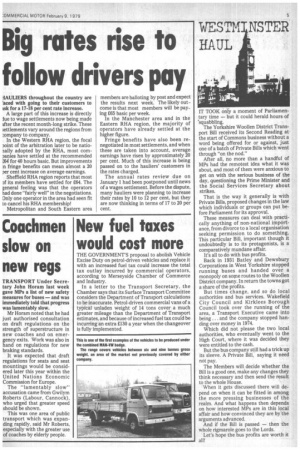WESTM NSTER HAUL
Page 7

If you've noticed an error in this article please click here to report it so we can fix it.
IT TOOK only a moment of Parliamentary time — but it could herald hours of "squabbling.
The Yorkshire Woollen District Transport Bill received its Second Reading at the start of Commons business without a word being offered for or against, just one of a batch of Private Bills which went through "on the nod."
After all, no more than a handful of MPs had the remotest idea what it was about, and most of them were anxious to get on with the serious business of the day, questioning the Prime Minister and the Social Services Secretary about strikes.
That is the way it generally is with Private Bills, proposed changes in the law which individuals or groups can put before Parliament for its approval.
These measures can deal with practically anything of non-national importance, from divorce to a local organisation seeking permission to do something. This particular Bill, important though it undoubtedly is to its protagonists, is a comparatively mundane affair. It's all to do with bus profits.
Back in 1931 Batley and Dewsbury Corporations in West Yorkshire stopped running buses and handed over a monopoly on some routes to the Woollen District company. In return the towns got a share of the profits.
But times change, and so do local authorities and bus services. Wakefield City Council and Kirklees Borough Council took over the running of the area, a Transport Executive came into being . and the company stopped handing over money in 1974.
Which did not please the two local authorities, who eventually went to the High Court, where it was decided they were entitled to the cash.
But the bus company still had a trick up its sleeve. A Private Bill, saying it need not pay.
The Members will decide whether the Bill is a good one, make any changes they think necessary and then send the result to the whole House.
When it gets discussed there will depend on when it can be fitted in among the more pressing businesses of the realm. And what happens then depends on how interested MPs are in this local affair and how convinced they are by the arguments advanced.
And if the Bill is passed — then the whole rigmarole goes to the Lords.
Let's hope the bus profits are worth it all!




































































































